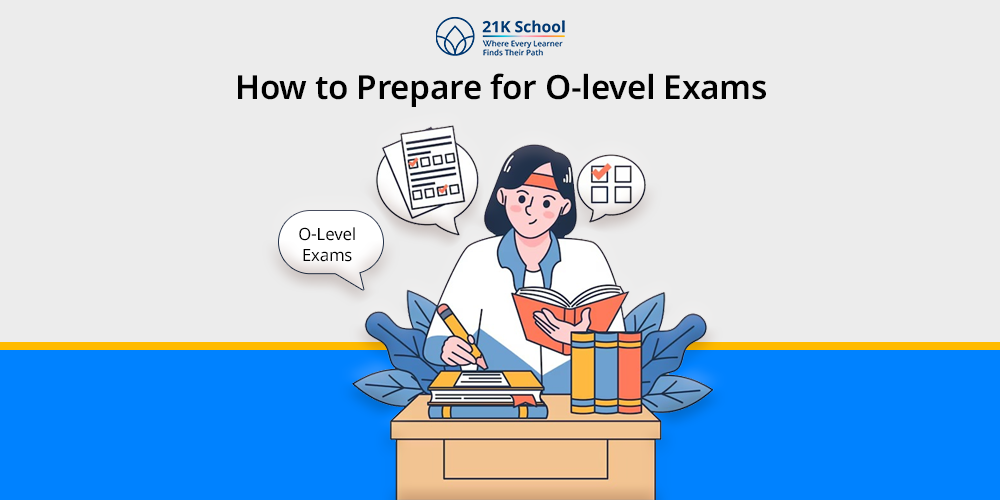
If you are sitting the O-level exam and want a 100% then here are some tips for preparation.
Each year, thousands of students sit the O-level exam. For a 100% mark, students study for the exam. For children, O-level is the most common exam.
So students draw up study timetables , write past year question papers and they make mistakes. Important exams also need to be planned.
Good exam preparation improves your academic performance . Make a study plan allowing time for each subject/topic. So keep your studies short and realistic.
Contents
- What Exactly is an O-Level Exam?
- How to Prepare for O-level Exams?
- 1. Understand Syllabus
- 2. Learn about the Exam Structure and Pattern
- 3. Start Early
- 4. Create a Study Routine
- 5. Start with the Simple First
- 6. Participate in Mock Test
- 7. Practice Past Question Paper
- 8. Practise in Exam Conditions
- 9. Focus on Revisions
- 10. Clarify Doubts
- 11. Use Mindmaps
- 12. Maintain Healthy Diet
- 13. Take Small Breaks
- 14. Stay Calm and Motivated
- Final Note
What Exactly is an O-Level Exam?
At around 14 to 16 years of age students take the O Level – an internationally recognised qualification. It tests students ‘knowledge / understanding of subjects which lead to further education / career paths.
It is recognised by educational establishments and employers worldwide. That includes maths and sciences and history and languages etc.
Written papers and practical assessments are usually included along with coursework or oral – depending on the subject and exam board.
It is essential to note here that O-Levels were replaced by GCSEs in the UK in 1988, and now O-Levels mainly exist internationally through Cambridge Assessment International Education.
How to Prepare for O-level Exams?
For O-levels you have to be disciplined – academically and personally. And so students have to be very prepared for the O-level exam. Students prepare for the O-level exam.
1. Understand Syllabus
Read the official syllabus first. So in short the syllabus is a road map to learn topics, learning objectives and skills to master subjects.
Students, you should cross reference it with your textbooks and notes as well. This stops you from going over boring stuff and puts high yield material first in your study plan.
2. Learn about the Exam Structure and Pattern
As well as multiple choice, short answer questions, there are essays, practicals which take around 45 minutes to 2 hours 30 minutes per paper.
Using sample papers or exam guidelines of the exam board, students can check the format – sections/time allocution per question – and marking schemes. Having this familiarity reduces exam stress on exam day and gives students early time management and question interpretation skills.
3. Start Early
Preparation should begin 6-12 months before the start of the academic year. Start earlier so kids can go over the syllabus slowly without cramming for better retention & less student stress .
It gives time to spot the weaknesses in first assessments and to get help quickly. It is a process of reducing enormous amounts of material into manageable chunks – it broadens understanding and builds stamina for long-term study.
4. Create a Study Routine
Usually, a timetable of study is prepared – a daily or weekly timetable of subject times and rest periods.
It makes studying habitual , it gives balance, and it prevents procrastination. For each subject, give specific times and try to keep to this schedule with breaks and other things besides.
5. Start with the Simple First
Start your study session/subject review with the simplest topics. Having success with basic concepts is cognitively good. And since most topics at least require some base knowledge to get started, getting the basics makes learning the advanced stuff much easier.
If basic concepts are firm enough they are easier to get around since most are built upon them. That avoids overwhelm, students get immediate results and keeps students going.
6. Participate in Mock Test
Mock tests are a kind of readiness test. Mock tests are effective techniques for the preparation for O-level exams. So the theory becomes practice – the test is familiar – and students are less stressed.
The mock test also tells you where students are weak and strong. That also helps students with time management and productivity.
7. Practice Past Question Paper
You can use past papers for the O-level exams. It says what examiners want – question formats, repeated themes/topics.
Check out not just the papers but also the marking schemes to see how answers are graded. You write short responses and learn time management skills .
8. Practise in Exam Conditions
Past papers and mock tests are in exam conditions – you have to be disciplined and realistically ready for the exam. It’s about getting away from things – people, timing yourself strictly – and working without notes or textbooks.
Practicing exam conditions trains your brain for long periods of concentration, time management and exam stamina. It also gets you used to the pressure and mental demands of the exam hall – less nervous and more confident.
9. Focus on Revisions
Regular revision also makes you feel more prepared and less likely to forget stuff under exam stress. Set up regular revision sessions where you review stuff that you know instead of just learning new stuff.
Good revision would involve active learning – for example, summarising notes in your own words / flashcards / quizzing yourself / explaining something to someone else.
10. Clarify Doubts
Unresolved doubts are the biggest barrier to exam preparation. And anything that bothers you, fix it now instead of putting it off.
If you clear doubts early, you avoid confusion later. Teachers, tutors, classmates or free online education tutorials/discussion boards can help.
11. Use Mindmaps
Mental models link information in a way that revising becomes fun. With mind maps you break big topics down into smaller interconnected parts that are easier to remember.
Colors, symbols and keywords link things together on mind maps – you get the big picture as well as the little details. Mind maps help with recall on exams and revising – less drab.
12. Maintain Healthy Diet
A proper diet gives you concentration, memory and energy. Eat lots of fruits and vegetables, whole grains, lean proteins, nuts and fish.
Good for your brain as these foods contain brain vitamins and minerals. Frequent caffeine, sugary snacks or junk food mess with your energy and mood/focus.
13. Take Small Breaks
Studying for long hours without breaks causes mental exhaustion, lower productivity and lower retention. Short, frequent breaks help your brain recharge.
During breaks go somewhere else, stretch or do something else relaxing, but avoid screen time – it will strain your eyes and distract you when you go back to study. Timed breaks promote study efficiency & prevent burnout.
14. Stay Calm and Motivated
Test prep is stressful but good for you. Calm allows better thinking, better decisions and working under pressure. Goals make you work harder.
Stress management – deep breathing, meditation or talking with a friend or relative. A calm, motivated mind improves learning and exam performance.
Final Note
Preparing for the O-Levels is a consistent process. Good knowledge of syllabus, early start, realistic study plan & past papers, mock tests & mind maps will boost students’ performance.
Regular revision, healthy living, managing stress and removing doubts are just as important on exam day. Always remember success is a daily effort, a matter of planning ahead and of discipline.



